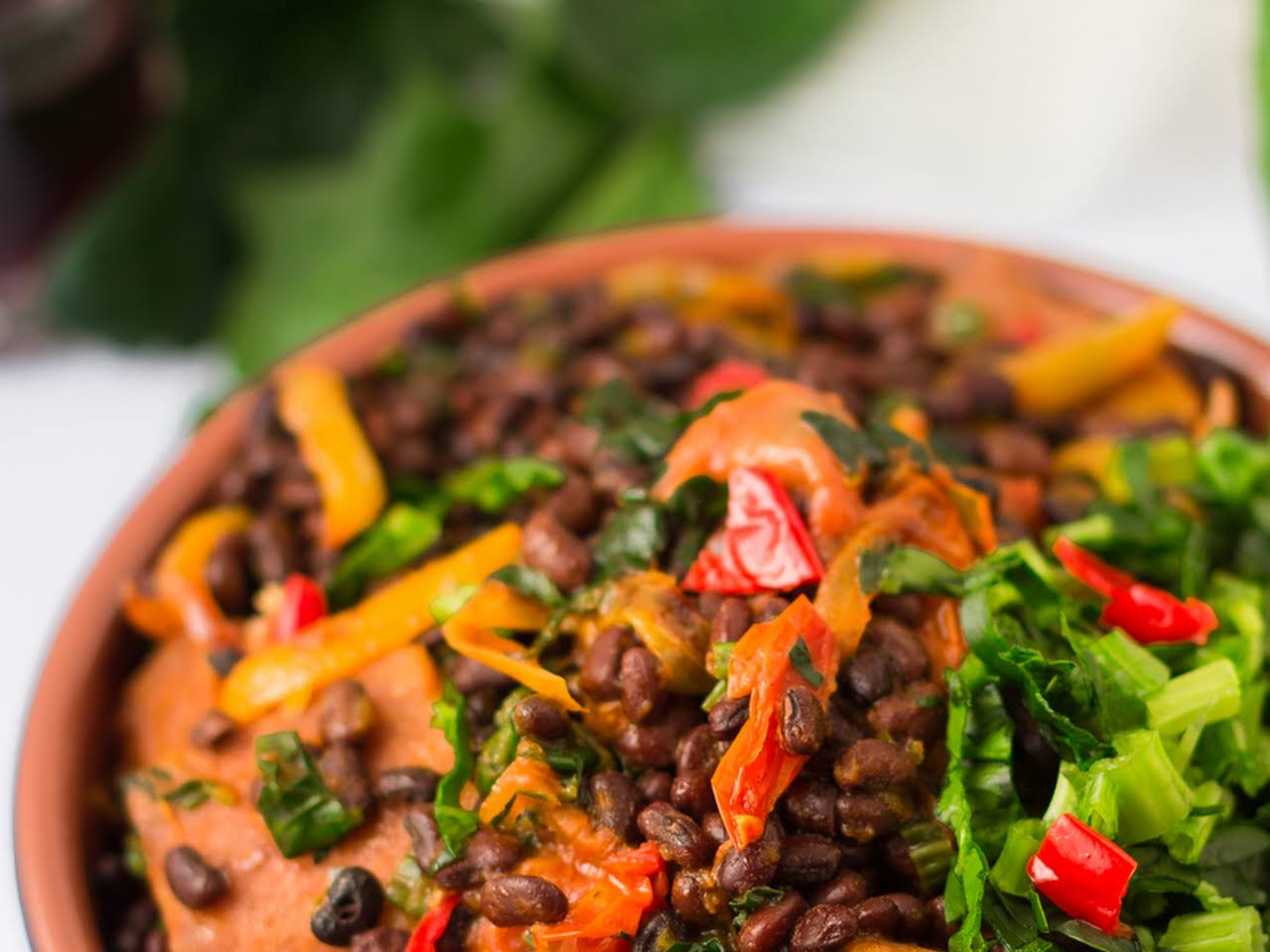FOOD
10 Tips To Avoid Overeating
Published
1 year agoon

Overeating can happen for different reasons, like when your eyes want more food than your stomach can handle at a buffet or a party. But sometimes, overeating becomes a regular habit rather than a one-time thing.
So, how do you know when you’ve eaten too much, and how can you stop it?
Overeating means eating more than your body needs for energy. It is something most of us experience occasionally, leading to short-term discomfort in the stomach. However, continuous overeating can have lasting health consequences.
Recognizing when you’re overeating and taking steps to address this behaviour is crucial for your well-being.
What Are The Signs Of Overeating?
Determining if you’re overeating might seem straightforward, like counting calories, but it is not that simple. This is because the number of calories you should eat per meal varies from person to person due to different health goals and needs.
It can be challenging to figure out your ideal calorie intake, and calorie counting may not promote a positive relationship with food.
Furthermore, calories alone aren’t a good indicator of mindful eating and recognizing when you’re satisfied, which are crucial aspects of nourishing your body properly and understanding if you’re overeating.

With that in mind, the actual signs of overeating may include:
- Eating beyond the point of being full
- Finding yourself mindlessly eating because you’re bored or distracted
- Experiencing physical symptoms after eating, including nausea, abdominal discomfort, gas, bloating or heartburn
- Eating for reasons other than to fuel your body
Overeating can have both short-term and long-term consequences. In the short term, it can lead to discomfort and weight gain. It might become harder to lose excess weight, and digestive issues may persist over time.
However, there are also less visible long-term health effects. Arrindell mentions that overeating, over weeks, months, or years, can influence cholesterol levels and potentially disrupt blood sugar control, increasing the risk of developing type 2 diabetes and heart disease. These hidden impacts might not be immediately apparent but could surface in your blood work.
How To Stop Overeating
If you recognize the signs and are ready to take action, here’s what we recommend to help you avoid overeating:
1. Familiarize yourself with recommended portion sizes
The size of your portions is crucial. To help control your portion sizes, you can make use of nutrition labels and recommended serving sizes from reliable sources.
While these guidelines may not be perfect, they provide a useful starting point for understanding what a reasonable serving looks like, which can be challenging to estimate on your own. Following these recommendations also helps you stay accountable for your food intake.
Get the latest & greatest updates right away! Join our exclusive WhatsApp Channel & never miss out on exciting news again.
Another effective strategy is to eat from smaller plates. Using larger plates can often lead to overeating, especially if you’ve been accustomed to finishing everything on your plate.
Switching to smaller plates can help you maintain more appropriate portion sizes and avoid overindulging, even though you don’t need to finish everything on your plate, according to Arrindell.
2. Include a fibre source with meals and snacks
Fibre is great for making you feel full after a meal. For example, consider a plate of roasted vegetables compared to several pieces of cheese with the same number of calories. The vegetables are likely to make you feel more satisfied because they contain fibre, which contributes to that feeling of fullness, helping prevent overeating.

In contrast, cheese is less filling, meaning you might end up eating more than your body requires before you realize you’re full, as your brain takes longer to recognize your satiety when consuming foods with less fibre.
3. Avoid skipping meals
Intermittent fasting, which involves skipping meals, is a popular diet trend. However, for some individuals, this approach may trigger a pattern of extreme hunger that unintentionally leads to overeating.
Skipping meals can create strong hunger, often leading to episodes of overeating when you eventually eat. Instead, opting for healthy snacks between meals or consuming smaller, more frequent meals throughout the day would help to avoid this feast-or-famine mentality.
4. Know and limit the foods that are easiest to overeat
We often wish for a simple list of foods to avoid entirely, but it is not that straightforward. Food preferences vary from person to person, making it hard to create a universal list.
To gain insight into your own eating habits, keep a food journal. It can help identify which foods are challenging for you.
However, many people tend to overindulge in calorie-dense or processed foods they consider treats. These foods are often high in:
- Salt
- Sugar
- Saturated and trans fats
- Empty calories.
There’s no food you should overeat, as even excessive consumption of healthy options like fibre-rich vegetables can lead to digestive discomfort.
5. Stay hydrated
Sometimes, feelings of thirst can be confused with hunger. When you’re experiencing hunger or craving a snack, try drinking a few sips of water. It can help you figure out if you’re truly hungry or just in need of hydration.
Staying adequately hydrated throughout the day can also help prevent those misleading hunger pangs that are, in fact, caused by thirst.
6. Be mindful about why you’re eating and pay attention to hunger cues
There are many reasons people eat, but the primary one should be to nourish and energize their bodies.
From snacking, because you think you should to following mealtime routines, it is essential not to fall into the habit of mindless eating.
If you’re not paying attention to what you’re eating and why, you’re likely not tuned into your body’s cues for hunger and appetite.
When you’re unaware of when to stop eating, the risk of overeating increases. Being mindful of your meals and food choices is crucial because it helps you connect with your body’s signals and enjoy food as a means of nourishing your body.
7. Slow down
To prevent overeating, it’s vital to stop when you start feeling full. While portion sizing helps, the best approach is to slow down during your meal and pay attention to your body’s signals.

The objective is to allow your stomach and brain time to synchronize. It can take up to 20 minutes for your stomach to signal fullness to your brain.
Many people eat their meals in much less time. If you tend to overeat, consider strategies to slow down your eating process, such as using your non-dominant hand or pausing between bites.
8. Rethink that second serving
Slowing down your eating can also assist you in determining if you genuinely need more food on your plate. While a second helping is fine if you’re still hungry, it is a good idea to wait 5 to 10 minutes before getting it and ensure that the additional serving includes healthier choices like more vegetables.
9. Turn off your TV
To foster awareness of how you feel after eating, it’s beneficial to have mealtime and snack time without distractions. A good starting point is turning off the TV and sitting down at the table.
Eating without diversions helps you reconnect with the purpose of nourishing your body, which is the true essence of food.
10. Give yourself some grace
Dealing with overeating requires patience and flexibility, whether you encounter challenges at the beginning of your journey or during the holidays.
Allowing yourself to enjoy your favourite foods in moderation is beneficial because it prevents the urge to overindulge later on. Giving yourself some flexibility in your diet not only provides room for occasional treats but can also be the key to maintaining healthy eating habits, and reducing the risk of overeating.
Why am I overeating?
Overeating can occur occasionally, especially on occasions with abundant food, like Thanksgiving. In some cases, it can become a pleasurable yet unhealthy habit that reinforces itself over time. The steps mentioned earlier may help break this habit.
However, when overeating becomes a habitual behaviour, it is essential to examine why it’s happening more frequently. There might be underlying reasons behind this habit, such as emotional issues, a phenomenon known as emotional eating. Recognizing and processing these emotions is crucial in reducing overeating.
In more severe instances, overeating might be a sign of binge eating disorder. Seek help from a dietitian or doctor if you frequently overeat, as it could be linked to binge eating tendencies, a treatable condition with the right support.
For more health tips, check here.
You may like
FOOD
4 Tips For A Stress-Free Cooking Experience This Christmas
Published
1 month agoon
December 22, 2024
The Christmas season is a time for joy, family, and delicious meals. However, cooking can often feel overwhelming, especially with the holiday hustle. With the right approach, cooking Christmas meals can be a stress-free experience.
Here are four practical tips for a stress-free cooking experience this Christmas.
1. Plan Ahead for Every Detail
Preparation is the key to success in the kitchen. Start by creating a detailed menu. Write down the dishes you want to make, the ingredients you need, and the estimated time for each recipe. This planning ensures you stay organised.
Invest time in grocery shopping early. Stores can be crowded closer to Christmas, so getting what you need in advance helps avoid the rush.
Batch-process tasks like peeling vegetables or marinating meat a day or two before. Following these tips for stress-free cooking keeps last-minute chaos at bay.
2. Simplify Your Menu
Christmas meals don’t need to be extravagant to be memorable. Focus on a few key dishes that everyone loves rather than a spread that leaves you exhausted. Choose recipes that are easy to prepare and don’t require constant attention.
For desserts, consider make-ahead options like pies or cookies. These can be prepared in advance, allowing you to spend more time with your guests. Simplifying your menu is one of the best tips for stress-free cooking this Christmas.
3. Use Time-Saving Tools and Techniques
Modern kitchen gadgets are lifesavers during Christmas. Slow cookers, food processors, and stand mixers can help speed up the process while reducing effort.
For large meals, use your oven efficiently. Bake multiple dishes at once if they require the same temperature. Pre-chop ingredients or buy pre-cut options to save valuable time.
Embrace these tips for stress-free cooking to make your holiday meal prep smoother and faster.
4. Delegate and Involve Others
You don’t have to do everything yourself. Share the workload with family or friends. Assign simple tasks like setting the table, washing vegetables, or stirring sauces to others.
If guests offer to bring a dish, accept their help. Potluck-style dinners reduce your cooking burden while adding variety to the table.
Delegating responsibilities is among the most effective tips for stress-free cooking, ensuring you enjoy the process too.
Cooking for Christmas doesn’t have to be a source of stress. By planning ahead, simplifying your menu, using time-saving techniques, and involving others, you can create a joyful and memorable meal.
These four tips for stress-free cooking will not only lighten your load but also let you focus on the true spirit of the season: togetherness and gratitude.
Keep these strategies in mind as you prepare your holiday feast. Merry Christmas and happy cooking!
For more reads, visit here.

Akidi (black beans) recipes are a cornerstone of Enugu State’s culinary heritage, enjoyed widely across Nigeria and Africa. This versatile legume, rich in protein, fibre, and essential vitamins, makes it a nutritious staple in many homes.
Originating from Enugu, akidi holds a special place in traditional dishes, offering robust flavour and health benefits.
If you’re looking to expand your cooking repertoire, these three delicious akidi (black beans) recipes will elevate your meals.
Whether you’re an experienced chef or a kitchen novice, each akidi (black beans) recipe provides a unique taste experience.
Embrace the richness of Enugu’s culture and impress your family with these flavourful and nutritious dishes featuring the beloved black beans.
Recipe 1: Classic Akidi Soup
Ingredients:
- 1 cup dried black beans (akidi)
- 1 large onion, chopped
- 2 scotch bonnet peppers, chopped
- 2 tablespoons palm oil
- 1 teaspoon dried crayfish
- 1 teaspoon salt
- 1/2 teaspoon black pepper
- 1 stock cube
- Water
Instructions:
- Soak the beans: Rinse the black beans and soak them in water overnight.
- Cook the beans: Drain the soaked beans and add them to a pot with fresh water. Bring to a boil, then reduce heat and simmer until the beans are tender.
- Sauté the aromatics: Heat the palm oil in a separate pot. Add the chopped onion and scotch bonnet peppers, and sauté until fragrant.
- Combine the ingredients: Add the sautéed ingredients to the pot of cooked beans. Stir in the dried crayfish, salt, black pepper, and stock cube.
- Simmer and serve: Simmer the soup for an additional 10-15 minutes, or until the flavours are well combined. Serve hot.
Recipe 2: Akidi with Spinach and Plantain

Ingredients:
- 1 cup cooked black beans (akidi)
- 1 bunch spinach, chopped
- 2 ripe plantains, sliced
- 1 onion, chopped
- 2 cloves garlic, minced
- 1 teaspoon ginger, grated
- 1 teaspoon curry powder
- 1/2 teaspoon turmeric powder
- Salt to taste
- Vegetable oil
Instructions:
- Heat the vegetable oil in a pot. Add the onion, garlic, and ginger, and sauté until fragrant.
- Add the spinach: Add the chopped spinach to the pot and stir until wilted.
- Combine the ingredients: Add the cooked black beans, curry powder, and turmeric powder to the pot. Stir to combine.
- Fry the plantains: In a separate pan, fry the plantain slices until golden brown.
- Serve: Serve the akidi and spinach mixture with the fried plantains.
Recipe 3: Akidi with Smoked Fish and Vegetables

Ingredients:
- 1 cup cooked black beans (akidi)
- 1 smoked fish, crumbled
- 1 large onion, chopped
- 2 carrots, diced
- 1 green bell pepper, diced
- 1 teaspoon thyme
- 1/2 teaspoon black pepper
- Salt to taste
- Vegetable oil
Instructions:
- Heat the vegetable oil in a pot. Add the onion, carrots, and bell pepper, and sauté until softened.
- Add the beans and smoked fish: Add the cooked black beans and crumbled smoked fish to the pot. Stir to combine.
- Season and simmer: Season with thyme, black pepper, and salt. Simmer for 10-15 minutes, or until the flavours are well-combined.
- Serve: Serve the akidi with smoked fish and vegetables hot with rice, yam, or bread.
These three akidi (black beans) recipes are just a starting point. Feel free to experiment with different ingredients and flavours to create your own unique dishes.
Remember, the key to a delicious akidi dish is to use high-quality ingredients and to cook slowly to allow the flavours to develop.
Whether you’re a seasoned cook or a novice in the kitchen, these akidi (black beans) recipes are a great way to enjoy this nutritious and flavourful legume.
For more articles on food recipes, visit here.

Garlic is more than just a flavour enhancer; it offers numerous health benefits that have been celebrated for centuries. Incorporating garlic into your meals not only enriches the taste but also boosts your overall well-being.
Let’s explore five key health benefits of garlic, emphasising why this simple ingredient deserves a spot in your kitchen.
1. Boosts Heart Health
Garlic is renowned for its heart-protective properties. It helps lower blood pressure and reduces cholesterol levels, which are crucial factors in maintaining cardiovascular health.
Allicin, a compound found in garlic, relaxes blood vessels, improving blood flow and reducing the risk of heart disease.
Regular consumption of garlic may also prevent artery hardening, a condition known as atherosclerosis. Clearly, one of the primary health benefits of garlic is its contribution to a healthy heart.
2. Strengthens the Immune System
Garlic acts as a powerful immune booster. Its antibacterial, antiviral, and antifungal properties help the body fend off infections. Rich in antioxidants, garlic combats free radicals that can damage cells and contribute to illness.
Cooking with garlic regularly can support your immune system, making it more resilient against common colds and flu. This vital health benefit of garlic makes it a natural defence mechanism.
3. Improves Digestive Health
Garlic promotes healthy digestion by stimulating the production of digestive enzymes. Its antimicrobial properties can help balance gut flora, reducing harmful bacteria and promoting beneficial ones.
Additionally, garlic may reduce inflammation in the gut, alleviating symptoms of conditions like irritable bowel syndrome (IBS).
Including garlic in your diet can improve overall digestive function, emphasising another essential health benefit of garlic.
4. Enhances Bone Health
Surprisingly, garlic may also support strong bones. It contains minerals like calcium, manganese, and selenium, which are vital for bone density and strength.
Some studies suggest that garlic consumption can increase estrogen levels in women, potentially reducing the risk of osteoporosis.
This lesser-known health benefit of garlic highlights its role beyond the kitchen, contributing to long-term skeletal health.
5. Supports Detoxification
Garlic aids the body’s natural detoxification process by activating liver enzymes that help eliminate toxins. Its sulfur compounds enhance liver function, enabling the body to flush out heavy metals and harmful substances more efficiently.
Regularly cooking with garlic can provide a natural cleanse, supporting overall vitality. This detoxifying health benefit of garlic underscores its importance for maintaining internal balance.
Incorporating Garlic into Your Diet
Maximise these health benefits by adding garlic to soups, stir-fries, and sauces. Crush or chop it and let it sit for a few minutes before cooking to enhance its beneficial compounds.
Remember, the health benefits of garlic are most potent when it’s used fresh and minimally cooked.
Cooking with garlic not only elevates your culinary creations but also offers significant health advantages. Embrace this versatile ingredient and enjoy the multiple health benefits of garlic with every meal.
Would you like more articles or additional tips? Check here.
Latest


5 Things To Expect In Afrobeats In 2025
Afrobeats is poised to reach unprecedented heights in 2025 as Nigerian music continues its remarkable global ascent. The genre’s explosive...


Here Are The 7 Most Ancient Countries On Earth
The oldest countries in the world stand as remarkable testaments to human civilisation, each containing landscapes and monuments that narrate...


Why Self-Reflection Is More Important Than Resolutions
Millions of people embark on a yearly ritual: they sit down with a notebook and pen, eager to craft a...


Nollywood Director, Kemi Adetiba Teases King Of Boys 3
Nollywood director Kemi Adetiba has revealed that another instalment of King of Boys will be released on December 25, 2025....


John McEnroe Says He Can Be The Commissioner Tennis Needs Amid Doping Crisis
Recent doping controversies involving top players have not damaged tennis’s reputation, but John McEnroe believes that appointing a single commissioner...


“Everybody Loves Jenifa” Becomes Nollywood’s Highest-Grossing Film Of All Time
Nollywood filmmaker Funke Akindele has achieved a historic milestone with her latest film, “Everybody Loves Jenifa.” The film has officially...


FG To Premiere TV Series, “Hidden Riches” On Mining Sector On January 25
Nigeria’s Federal Government will launch an ambitious television drama series focused on the nation’s mining sector, premiering “Hidden Riches” on...


Qing Madi Delivers A Soulful Performance Of “Favourite Pyscho”
Rising Afro-RnB sensation Qing Madi launches into 2025 with a mesmerising performance on the prestigious COLOURS platform, showcasing her latest...


Taiwo Awoniyi’s First Goal Of The Season Seals Nottingham Forest’s Win Over Wolves
Taiwo Awoniyi made a triumphant return to Premier League action. He scored in stoppage time to help Nottingham Forest crush...


Tems, Ayo Edebiri, Wizkid & More Nominated For The 56th NAACP Image Awards
The 56th NAACP Image Awards have unveiled their nominations. It highlights various exceptional talents. These talents include Nigerian stars Tems,...
-Ad-




Funke Akindele Breaks Records Again As “Everybody Loves Jenifa” Surpasses ₦1 Billion In 12 Days

Police Deny Knowledge & Investigation Of VeryDarkMan’s Missing N180m

Funke Akindele’s “Everybody Loves Jenifa” Rakes Box Office With ₦511 Million In Just 12 Days

Speed Darlington’s ₦300m Rights Suit Against I-G Set For Hearing January 13

Cobhams Asuquo’s Birthday Look Exudes Cinematic Vibe

The Real Housewives Of Lagos Reveals Cast Members Ahead Of Season 3

Paul Okoye And Wife Ifeoma Dedicate Baby Girl At Church

Olamide & Asake Officially Part Ways; Alleged Details Of Contract Termination Emerge

Dele Farotimi Breaks Silence After Release From Detention















